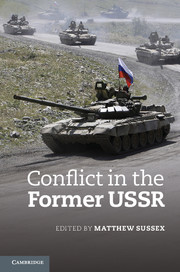Book contents
- Frontmatter
- Contents
- Maps
- Contributors
- Acknowledgements
- Abbreviations
- Map
- 1 Introduction
- 2 The return of imperial Russia
- 3 The shape of the security order in the former USSR
- 4 Great powers and small wars in the Caucasus
- 5 The Russo-Georgian war
- 6 Why not more conflict in the former USSR?
- 7 Transnational crime, corruption and conflict in Russia and the former USSR
- 8 The transformation of war?
- 9 Conclusions
- Bibliography
- Index
- References
7 - Transnational crime, corruption and conflict in Russia and the former USSR
Published online by Cambridge University Press: 05 November 2012
- Frontmatter
- Contents
- Maps
- Contributors
- Acknowledgements
- Abbreviations
- Map
- 1 Introduction
- 2 The return of imperial Russia
- 3 The shape of the security order in the former USSR
- 4 Great powers and small wars in the Caucasus
- 5 The Russo-Georgian war
- 6 Why not more conflict in the former USSR?
- 7 Transnational crime, corruption and conflict in Russia and the former USSR
- 8 The transformation of war?
- 9 Conclusions
- Bibliography
- Index
- References
Summary
A November 2008 survey of Russians revealed that almost 60 per cent of respondents considered corruption to be the most important problem President Medvedev needed to address. Given that the survey was conducted at the peak of the global financial crisis (GFC), the significance of corruption to Russians is highlighted well by this survey response. That it is a key issue is endorsed by the fact that, in June 2009, former Soviet leader, Mikhail Gorbachev, identified ‘bureaucracy and corruption’ as Russia’s main problems. Certainly, President Medvedev made the fight against corruption his top priority when he first took office. On 19 May 2008, he signed a decree aimed at breathing new life into the Russian state’s efforts to combat the phenomenon. In early November 2008, in his first annual ‘state of the nation’ address to the Federal Assembly, Medvedev identified corruption as the ‘number one enemy for a free, democratic and just society’. And outgoing President Putin stated in mid-February 2008 that corruption had been the most intractable problem he had faced as president. Russians apparently see the fight against corruption and bribery as his biggest failure as prime minister too, according to a July 2009 survey by the Levada Center. Much more recently, a poll in August 2010 by the Levada Center revealed that Russians saw the fight against corruption and bribery as Putin’s single biggest failing over his decade in high office. Clearly, the issue is a significant one in post-communist Russia.
But so too is organised crime. While such assessments must be treated as no more than informed guesses, Izvestiya claimed in 1994 that organised crime controlled some 70–80 per cent of banking and private business in Russia. Even though this was almost certainly a sensationalised exaggeration – and is based on a very broad definition of organised crime – the statement itself reveals how serious an issue the Russian administration perceived the problem of organised crime to be, or at least how seriously it wished to portray it. This point is endorsed by the 1993 statement by President Yeltsin that ‘[o]rganised crime has become a direct threat to Russia’s strategic interests and national security’.
- Type
- Chapter
- Information
- Conflict in the Former USSR , pp. 146 - 171Publisher: Cambridge University PressPrint publication year: 2012

